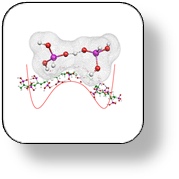
Dr. Jan-Ole Joswig
Navigation
Proton-Transfer Reactions in Soft Matter

Proton-transfer reactions and mechanisms are essential in technological processes, e.g. in proton-exchange membrane fuel cells (PEMFCs).
The fuel cell membrane is responsible for the transport of protons between the electrodes. Different membrane materials are used to date,
of which Nafion is the most common one. However, the proton transport in Nafion membranes critically depends on the water content,
which limits the operating temperature to the boiling point of water.
State of the art research on water-free proton transport favours protogenic groups other than the sulfonic-acid group that is essential
in the Nafion membrane. Possible candidates are phosphonic acid and imidazole. We study these materials with respect to their
proton-transporting properties using quantum and classical molecular dynamics as well as Monte-Carlo methods.
» Selected references:
-
Enhanced proton transfer activity in imidazole@MIL-53(Al) systems,
E. Eisbein, J.-O. Joswig, G. Seifert,
Micropor. Mesopor. Mater. 216 (2015), 36–41. -
Proton conduction in a MIL-53(Al) metal-organic framework: confinement vs. host/guest interaction,
E. Eisbein, J.-O. Joswig, G. Seifert,
J. Phys. Chem. C 118 (2014), 13035–13041. - Preconditioning immobilized imidazole arrays for optimal proton-transfer feasibility,
W. L. Cavalcanti, D. F. Portaluppi, and J.-O. Joswig,
J. Chem. Phys. 133 (2010), 104703/1-6. - Aspects of the proton transfer in liquid phosphonic acid,
J.-O. Joswig and G. Seifert,
J. Phys. Chem. B 113 (2009), 8475-8480. - Properties of the phosphonic-acid molecule and the proton
transfer in the phosphonic-acid dimer,
J.-O. Joswig, S. Hazebroucq, and G. Seifert,
J. Mol. Struc.: THEOCHEM 816 (2007), 119-123.
 Home
Home